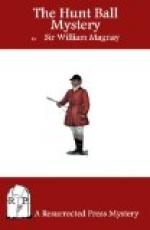That settled, they sat down to dinner.
“Tell me about the Morristons, Harry,” Gifford said. “He is a very good fellow, isn’t he?”
“Dick Morriston? One of the best. Straight goer to hounds and straight in every other capacity, I should say. You know they used to live at Friar’s Norton, near here, before they bought your uncle’s place.”
“Yes, I know. What is the sister like?”
“A fine, handsome girl,” Kelson answered, without enthusiasm. “Rather too cold and statuesque for my taste, although I have heard she has a bit of the devil in her. Quite a sportswoman, and as good after hounds as her brother. They say she had a thin time of it with her step-mother, and has come out wonderfully since the old lady died. Lord Painswick, who lives near here, is supposed to be very sweet on her. Perhaps the affair will develop to-night. The ball will be rather a toney affair.”
“Morriston has plenty of money?”
“Heaps. And the sister is an heiress too. The old man did not nearly live up to his income and there were big accumulations.”
“Which enabled the son to buy our property,” Gifford said with a tinge of bitterness. “Well, it might have been worse. Wynford has not passed into the hands of some Jew millionaire or City speculator, but has gone to a gentleman, a good fellow and a sportsman, eh?”
“Yes; Dick Morriston is all that. As the place had to go, you could not have found a better man to succeed your people.”
When the time came to start for the ball Gifford went down to see his friend off and to repeat his orders concerning the immediate delivery of his suit-case when it should arrive. Henshaw was in the hall, bulking big in a fur coat and complaining in a masterful tone of the unpunctuality of his fly. A handsome fellow, Gifford was constrained to acknowledge, and of a strong, positive character; the type of man, he thought, who could be very fascinating to women—and very brutal.
He dropped his rather bullying manner as he caught sight of the two friends; and, noticing Gifford’s morning clothes, made a casually sympathetic remark on his bad luck.
“Oh, I shall come on when my things arrive, which ought to be soon,” Gifford responded coldly, disliking the man and his rather obvious insincerity.
“We might have driven over together,” Henshaw said, addressing Kelson. “But I hardly cared to propose it after the line you took at the station.”
There was an unpleasant curl of the lip as he spoke the words almost vindictively, as though with intent to put Kelson in the wrong.
But his sneer had no effect on the ex-Cavalryman.
“I am driving over in my own trap,” he replied coolly, ignoring the other’s intent. “You will be a good deal more comfortable in a closed carriage.”
“Decidedly,” Henshaw returned with a laugh. “I am not so fond of an east wind as to get more of it than can be helped. And, after all, it is best to go independently to an affair of this sort. One may get bored and want to leave early.”




